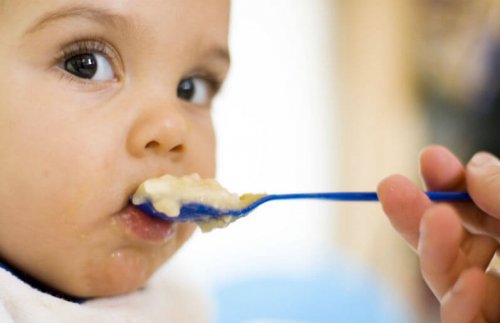When Should You Introduce Grains into Your Baby’s Diet?

Motherhood is a beautiful experience, but one that is also intimidating. Unknowns are a daily occurrence. A common question is when to introduce grains into your baby’s diet. We’ll discuss the answer below.
A baby’s diet is always a very delicate topic, especially for first-time moms. Grains, juices and soups are rich in nutrients and vitamins that are essential for your baby’s growth.
But when is the best time to start giving them to your baby? Is there a special way to prepare them? How should you introduce grains into your baby’s diet?
The general recommendation suggests that a baby should consume only breast milk for the first six months of life. Breast milk provides all of the nutrients that an infant needs.
Later on, you can offer other types of food and increase the variety of flavors and textures in their daily diet. To achieve this, grains are an excellent option.
Grains in your baby’s diet
Grains are a basic food, rich in fiber and carbohydrates. These nutrients help the development and correct functioning of your baby’s body. To make the most of these benefits, it’s helpful to know how to introduce grains into your baby’s diet.
How and when to give grains to babies
When your baby is 8 or 9 months old and can sit up on his own, it’s time to allow your baby to eat grains if he wants to. Of course, this should always be under the supervision of an adult.
At this time, he’ll attempt to eat with his hands; he’ll feel the texture of the grains with them, and then with his mouth. With each day that passes, the baby will become better accustomed to the texture and variety of flavors.

It’s important to remember that this experience should be enjoyable for your baby. Another aspect to consider is whether his body accepts the grains. We should be very aware of any allergic reactions.
To help babies eat grains, it’s a good idea to give them the grains in the form of a paste. To prepare them, you can mix the grains with breast milk. The best utensil for them to eat it with is a spoon. At this stage, you have to be very patient, learning to use a spoon is a big step.
Grains with and without gluten
It’s important to know what’s in the grains that you give your child. Nowadays there is a large variety, including those with and without gluten.
It’s also important to remember that not all children can tolerate gluten. Gluten intolerance, also know as celiac disease, causes an inflammatory immune response in the small intestine when foods containing gluten are ingested.
Only 1 in every 1000 children is celiac and they often inherit it. However, it can be present when no other family members have had it.
Advice for giving grains to babies
If you follow certain guidelines, it should be easy and comfortable for your child to begin eating grains. The following pieces of advice should allow you to move onto your baby’s next step without problems.
No gluten until at least 6 months
The aim is to avoid any kind of allergic reaction. You can offer your baby grains such as rice and maize. But with babies younger than 6 months old, it’s best to avoid wheat and any product that derives from it. These can be given to children when they’re a little older.
When you do start introducing grains containing gluten into your baby’s diet, you can start with a small amount of the grain in the bottle mixed with milk. If he reacts well to this, you can increase the quantity bit by bit, always keeping an eye out for any negative reactions to the food.
Purées made using grains containing gluten
When moving on from the bottle, purees are a substantial option and are rich in starch and proteins. Your baby is likely to be completely satisfied by this new nutritious source, he’ll probably feel full and won’t demand more food.
With these purées, it’s important not to add sugar, cocoa, honey, salt or other ingredients. The more natural it is, the better.

Wheat and barley
Wheat provides energy, prevents constipation and is rich in minerals and B vitamins. If possible, make the purees very smooth. As mentioned before, these foods should all be introduced after your baby is six months old.
Barley is very easy to digest. It’s rich in niacin and vitamins E and B (folic acid). Just like wheat, you can give it to your baby as a puree, as wholegrain bread or as flaked breakfast cereals.
To conclude, grains make up an essential part of your baby’s diet. The process is slow, but it has great results.
Don’t try to rush through the stages that your baby needs to go through. Try to make sure that the food you’re providing is age appropriate. Being responsible when choosing your baby’s diet will promote optimal growth without complications.
All cited sources were thoroughly reviewed by our team to ensure their quality, reliability, currency, and validity. The bibliography of this article was considered reliable and of academic or scientific accuracy.
- Introducing solid foods. NHS. UNICEF United Kingdom. [Online] Avaiable at: https://www.unicef.org.uk/babyfriendly/wp-content/uploads/sites/2/2008/02/Start4Life-Introducing-Solid-Foods-2015.pdf
- Baby’s first foods. Child and Adolescent Health Service. 2011. [Online] Avaiable at: https://www.health.wa.gov.au/docreg/Education/Population/Child_Health/Feeding/HP003055_babys_first_foods.pdf